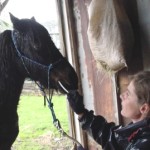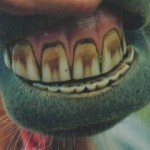By Cynthia Cooper
One of the few things horses and humans have in common is the need for annual check up with the dentist.
In days gone by the farrier also practiced horse dentistry so it was easy to slot in a quick check of the teeth when he visited on a regular basis. But now horse dentistry is much more specialized and requires a little more skill than being able to wield a rasp to knock off the sharp edges. Therefore, we need to make a special effort to book the dentist for a yearly check up and do the necessary preparation before he arrives.
“Preparation – what preparation?” most people would say – thinking it’s the dentists job to educate your horse to have his mouth handled. Unfortunately, this approach has led to a lot of dentists having to resort to tranquilizers so they can do the job without injury and trauma to themselves and the horse. Then you end up with a horse who increasingly fears the dentists visit.
It need not be this way if you are prepared to spend a few minutes a day or even a couple of times a week, desensitizing your horse to things around and in his or her mouth.
Just having a stranger wanting to prod and poke in the most sensitive part of their body is fear causing enough for a horse, so by getting them used to mouth handling, you are going to have a calmer, more accepting horse which your dentist will love.
 To start with, you should be able to rub your horse’s nose and lips with your fingers without him shying away – use approach and retreat and gentle rhythmic pressure while gently holding the halter so you can follow his movement if he pulls away. Keep the rubbing going until your horse is showing signs of acceptance then immediately leave him alone for a minute.
To start with, you should be able to rub your horse’s nose and lips with your fingers without him shying away – use approach and retreat and gentle rhythmic pressure while gently holding the halter so you can follow his movement if he pulls away. Keep the rubbing going until your horse is showing signs of acceptance then immediately leave him alone for a minute.
As your horse accepts your hand and fingers in and around the lips, start with rubbing the gums (which some horses love) and then the tongue, remembering to stop when there are signs of acceptance (not pulling away, relaxing the head, licking).
Once they are comfortable with you rubbing the tongue on the side where there is a gap in the teeth, work towards acceptance of your fingers in the mouth on top of the tongue, entering where the gap is. Then see if you can gently hold the tongue for a second before releasing it, being careful not to pull it as you can break a very fragile bone connected to the back of the tongue, rendering it useless.
When your horse accepts you gently holding the tongue for a second or two, you can then work on acceptance of simulated dentists tools in the mouth. The rubber handle on a training stick or crop is a good thing to start with as its soft with rounded edges. You might even get them to like it by smearing it with molasses or apple sauce.
Acceptance of a worming tube will also help and I’ve heard from a student that cleaning the teeth with a toothbrush is something her ponies really seem to enjoy.
Remember to allow the horse to check out anything you want to put in his mouth first, and even use it to groom him with so you are not being too direct line about getting it straight in the mouth.
The process may be quite fast for some young horses who are very mouthy anyway and love holding onto and chewing things so its good to introduce them to different objects and being able to gently rub their teeth with them.
For older horses who have maybe had a bad experience or who are naturally more wary and protective of their mouth, you will need to take it slowly and use some incentives like molasses or apple sauce.
Start with it on your finger then move onto other objects as they gain confidence which may have previously been shattered by rough handling or no preparation.
Choosing a dentist who has the right approach (slow and gentle) is also important for future confidence so ask around experienced horse people for recommendations.
We need to realize that mouth handling should be a part of our grooming routine, just like cleaning out the hooves to check on growth and for anything caught in the hoof.
It gives you the opportunity to notice anything out of the ordinary such as an abscess, grass seeds lodged in the gums or other problems.
Some horses even need regular cleaning of tartar build up around the edges of some teeth on a regular basis which is something the dentist can show you how to do quite easily.
And the other big benefit is the trust it builds in the relationship with your horse so don’t delay, use the winter months when less riding time is available to develop your horsemanship in other ways just as beneficial for you and your horse.
Regular teeth checks can help you notice problems like this offset jaw which may need special treatment.

